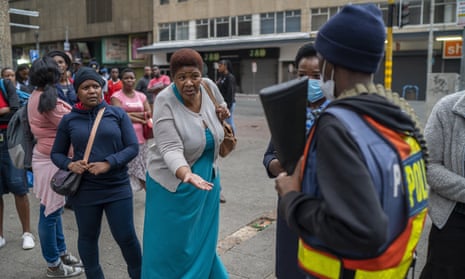The Covid-19 pandemic will have far-reaching implications for justice worldwide.
Already many places are seeing significant changes in crime patterns and criminality, and a reallocation of resources to deal with lockdown-related public order. Court operations will be disrupted for months to come. Postponed trials will become commonplace as the accused, witnesses, law enforcement officers, prosecutors, defence lawyers and court staff with coronavirus symptoms are placed in quarantine, or are required to self-isolate.
In the developing world especially, the economic impact of Covid-19 will be severe. The UN secretary general, António Guterres, has warned of a recession “perhaps of record dimensions”. In South Africa, GDP, already anaemic before the onset of Covid-19, is expected to contract by 6% this year.
It will likely take years before South Africa’s economic output is restored.
It is imperative that prosecution services confront the pandemic’s profound long-term risks and take a leading role as guardians of the rule of law.
Until then, unemployment, poverty and inequality will worsen. This has important implications for prosecutions. At the National Prosecuting Authority, we may need to consider operational changes to deal effectively, yet compassionately, with the expected increase in poverty-related crime.
Covid-19 has significant implications for good governance too, with the risk that emergency powers mandated by political executives become the new normal.
Policies driven by fear – albeit legitimate at the time – and enacted in a hurry become blunt and repressive instruments of state coercion, exacerbating problems rather than promoting recovery. The UN Human Rights Office has raised concerns about the excessive use of force employed by security forces in some countries to enforce lockdown regulations.
Arbitrary or clumsy state responses undermine public trust – precisely at a time when it is needed most. This is especially dangerous in societies where the poor and marginalised bear the heaviest burden – both in the enforcement of lockdowns and the resulting economic impact. It is a recipe for social strife and civil unrest.
The risk to the rule of law is especially acute where officials, politicians and those with commercial interests misuse the Covid-19 crisis for political or financial gain.
Vast sums of money are being mobilised to resuscitate devastated economies, creating opportunities for fraud and corruption in the procurement of state tenders, distribution of welfare funds and building state-funded health-related infrastructures.
Covid-19 and its public security, economic and political ramifications places a particular responsibility on prosecution services to ensure that the rule of law – that everyone is subject to the law and no one is above the law – is upheld.
Those abusing their authority or power must be prosecuted without fear or favour.
Where the enforcement of Covid-19-related regulations are arbitrary, excessive or discriminatory, prosecutors should proceed with caution and ensure prosecutions are in the public interest.
The socioeconomic disruption enjoins prosecutors to deal with those accused of minor poverty-driven crimes with empathy. Custodial sentences should be pursued as a last resort. Diversion should be preferred over lengthy trial processes, which potentially burden minor offenders with criminal records. Sentencing options that allow convicted offenders to engage in economically productive activities should be pursued.
A core tenet of the rule of law – the presumption of innocence – has become a vital public health consideration. Crowded prisons serve as vectors in the spread of Covid-19. Prosecutors must ensure pre-trial detention is only used in exceptional circumstances.
Prosecutors must vigorously pursue serious cases of corruption, especially involving state officials. Where available, asset forfeiture and recovery laws must be used to ensure proceeds of crime are put to productive economic use and stolen assets returned to their rightful owners.
Organised criminals will seek to exploit the public health crisis and its economic aftermath. Reports abound of criminal networks intensifying their operations in the fields of cybercrime, human trafficking and corruption in the public health sector.
In places with poor or weak governance, there is a heightened risk that law enforcement may collaborate with criminal gangs to enforce lockdown measures. Prosecutors must be particularly vigilant where state officials are co-opted by, or collude with, criminal groups.
Worldwide, crimes against society’s most vulnerable are rising – domestic violence, child and elder abuse, and internet-based sexual exploitation. Prosecution services need to make additional resources available so that such crimes are effectively prosecuted, and their victims treated with care and compassion.
In the era of Covid-19 it is vital that prosecution services are – and are seen to be – upholders and defenders of the law. Prosecution services need to fearlessly prosecute society’s most powerful. And independence must be modulated by accountability to ensure prosecutors’ actions are beyond reproach.
